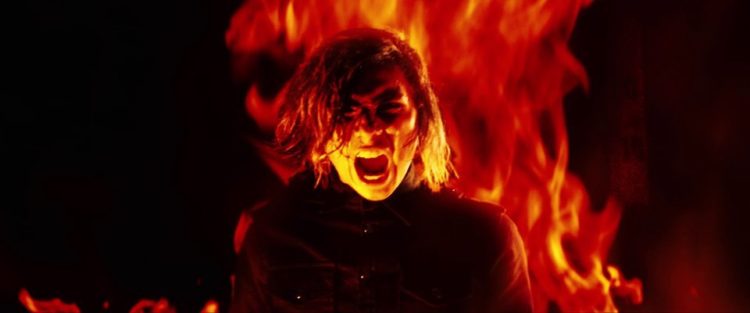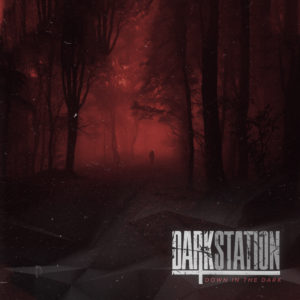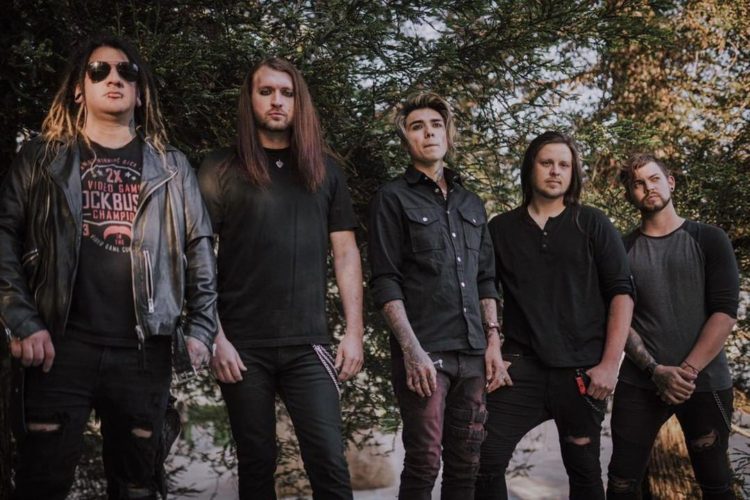
A new wave of hard rock bands is starting to arise in the musically fertile and fast moving region of Southern California. The same places that brought us the Doors, and later the 1980s hair metal scene, led by the likes of Motley Crue, Ratt and Poison, has now begun to unleash a new breed of rockers – bands and artists that have brought their own inspirations and aspirations into the mix, feeding off the energy of their predecessors, but bringing a new tone and approach to the music itself.
At the forefront of this explosion of talent is the irrepressible Dark Station.
This agglomeration of superior musicianship and songwriting acumen brings together five musicians who have had varying levels of success throughout the southern California rock and metal scene. Collectively, they are bringing into the new project their own vibrantly unique experiences and influences to form a creative whole that is definitely and definitively better than the sum of its talented parts.
Those five musicians/songwriters are vocalist Nathan Spades, the twin guitar attack of Kyle Ort and David Bruni, bassist Eric Sinful and drummer Dylan Roy, all of whom are celebrating the recent release of their first studio album, the incendiary, hook-laden and passionately profound Down in the Dark.
“I think we have brought back a familiar sound of the 1990s kind of grunge rock era and basically made it Dark Station, with some cool twists. We made original music out of the stuff we liked and the stuff that we were influenced by. I can’t really pinpoint a specific sound that we have, because we get a lot of different references and comparisons, and we’re cool with that. I would say, if you’re into rock music and you like it heavy when it needs to be and calm when it needs to be, we’re definitely for you. The number one thing we discussed when we first got together is that it’s got to be real, it’s got to be intense, but it also has to be accessible,” said Spades, who has lengthy experience on the California scene, including bands that shared bills with the groups September Mourning and Behind the Fallen, both of which featured, at one time or another, most members of what would become Dark Station nearly three years ago.
“There’s got to be some fine lines you’ve got to walk if you want to make this your career. And I don’t think it’s selling out to make your music well produced and accessible, because we love what we’ve created – every single note, every single lyric. We absolutely love it, and if you’re able to walk that line and have that mindset and say ‘what do we need to do to make our dreams happen, to make this music happen,’ that’s what’s it really is, and that’s what we did.
“We didn’t have a set direction in mind when we started writing. The sound that has come out on these songs came out naturally through the process. Once the songs started coming together, we realized how special they were, and that’s when we knew that we had a band. And that’s how it should be, it should be organic. It should never feel that you’re having to force something. If you come to a point where it feels like a job and you’re not having fun, then maybe you shouldn’t be doing it anymore.”
Dark Station’s music runs the gamut emotions, and also incorporates a delicious concoction of rock and hard rock styles, making for a unified sound that is both timeless and remarkably of the current era. Lyrically, Spades takes a novel approach of essentially improvising lyrics as he is listening to the tracks, with often these inspired missives ending up becoming the final product.
 “Lyrically, I don’t write for anyone else but me and I honestly don’t give a f*** if people don’t like it. Well, I am sort kidding, but you get the idea. The song Heroes on this album is kind of about our stance on our music. We’re going to make the music however the hell we want and whoever wants to be a part of the Dark Nation is welcome. If you don’t, that’s okay, I specifically wrote a lot of these lyrics because I was in a dark place in my mind, and I think I needed Dark Station more than Dark Station needed me, to be honest,” he explained.
“Lyrically, I don’t write for anyone else but me and I honestly don’t give a f*** if people don’t like it. Well, I am sort kidding, but you get the idea. The song Heroes on this album is kind of about our stance on our music. We’re going to make the music however the hell we want and whoever wants to be a part of the Dark Nation is welcome. If you don’t, that’s okay, I specifically wrote a lot of these lyrics because I was in a dark place in my mind, and I think I needed Dark Station more than Dark Station needed me, to be honest,” he explained.
“I tell people all the time that the people who love our music, what you guys don’t realize is this isn’t something I am doing to gain approval from anyone else; these lyrics that were written, the stuff that we sing, the stuff that we play is all part of our form of expression, our kind of therapy in a way. And people just happen to like it, which is f***ing amazing. I can’t even tell you how grateful I am for that.”
One of the most well-received songs/videos from Down in the Dark is the most recent single, Villain, which was inspired by a unique source – the world of comic books and comic book movies.
“It’s one of my favourite songs on the album, actually. It is 100 per cent about the character Venom, who is an alien symbiote, and his [reluctant] human host, a guy named Eddie Brock. Venom is kind of an anti-hero now and his story is literally the inspiration for this song. I watched the trailer for the movie [starring Tom Hardy in the titular roles] and was interested in what Eddie goes through and what Venom goes through trying to coexist within the same body; how Eddie wants to be a good person, but having to battle Venom who is this evil being from another planet. I have been fascinated by how Eddie can sort of assume some control but there is always the danger that the control will slip,” Spades explained, adding that it could also be seen to represent the dark and light that exists within each of us, and how, depending on circumstances, one can take control of the other.
No Life is a powerful and poignant commentary on depression and the depths of despair that can be reached by those who suffer – many beyond the point of seeing any value to their own lives.
“The first verse is more or less about how males react to a state of depression or addiction, because males and female are very different by nature. We’re very different in the ways that we react, we’re different in the ways we get addicted and what we do when we’re addicted to things and how we act when we’re depressed. I am not trying to generalize here at all, what I am saying is that this is based on people that I know personally, including myself. I wanted to paint that picture, which comes out in the video, of what males go through and what females go through an that in each case, it can be relevant to anyone who is struggling,” Spades explained.
“I just want people to listen to this and understand that no matter what you’re going through in your own head, just look out for others, because there might be someone else close to you who is way deeper into their own head and own pain than you are and may not have any idea how to get out. Whereas you might at least be scraping by and can throw them a bit of a lifeline. And I want people to be mindful of the warning signs and to look out for people who really do need help, because you could save a life just by being more aware of how people are around you.
“Listen, every day, every single day, we lose people because they just feel that the world is better off without them. So, I really wanted that song to resonate with everybody and make people more mindful of what’s going on around them.”
Switching thematic gears, Spades and Dark Station tackle another issue that plagues many people – finally waking up to the realization that one is in a toxic, even abusive relationship with the song Obvious.

“I have known so many women who are in those kinds of relationships, but they are so blinded by love that they just don’t think that they deserve better for themselves. It’s about being in a toxic relationship where you finally get to the point where you realize it – it’s like the blinders are coming off and you see this thing in the light of truth, and you realize how bad it is for you. It sort of snaps you out of it and you can see how clearly obvious the situation was, that it was always right in front of your face and obvious to everyone else around you, but you couldn’t see it until that ‘a ha’ moment,” he said.
“All of these songs have sort of darker themes and tones, but there is always a glimmer of hope in them It is me expressing my own struggles and frustrations and pain, knowing that other people need that kind of release too. Music is one of the most universal languages on the planet and anyone can interpret these songs however they want to. These songs relate to other people as well as to myself, and maybe, lyrically, some of these songs come at people from a different perspective and reach them in a different way where they can make up their own meaning out of it. When they sing the lyrics and what they want to think about when they’re singing the words, I want to be an open field. I think that makes the songs even more relevant, which is cool.”
It is an interesting phenomena that in the 2000s, music videos have now resumed the pre-eminence as a form of creative expression and marketing potency that they did back in the heyday of MTV and MuchMusic in the 1980s. Dark Station have taken this to a new level, spending a lot of time, energy and resources on crafting videos for their singles which are as evocative and memorable as the songs themselves.
“Obvious was pretty much all Robyn August. He made that video; he picked the location and it was his idea to include a tarantula and all that. That was all him, so I’ve got to give him credit for that. For the other three videos, Heroes, No Life and Villains, I wrote the treatments for all three of those and sent them into Erez [Bader], and he brought them to life. He took what I wrote … I gave him some descriptive parts of scenery because that’s how I had a vision and image in mind, and he did a great job of bringing those ideas that I had to life,” Spades said.
“I just provided a very simple, couple paragraph treatment of them and he did everything else: picked the locations, picked the cast. He especially did a f***ing phenomenal job on the Heroes cast. I was blown away just by the cast on that one. We all think it’s better marketing to have videos and to especially have good videos that people remember. Anyone can just say, ‘here’s a link, check out our band.’ If I was on the other end reading that 50 times a day, I would skip it – it doesn’t work any more.
“You need to give people something to watch. It’s the digital age and that’s just how it is. People’s attention spans are way shorter now than they ever have been. And that’s another reason why, even thought we have just released our first album, we’ve got to go in and start working on material for the second one, because momentum is huge. You can’t make people wait to long and you need things like videos to keep people interested.”
Spades said the band does not consider those who listen and love their music to be fans, but rather a collective, like a gang or even a family, hence the moniker, the Dark Nation.
“I was talking with Kyle one day talking about something to do with the band, and I remember saying that we should start using the term Dark Nation. I don’t even like to use the word fans; for some reason I just hate the word. I want the relationship to be more intimate than that. And that’s why I think Dark Nation is great and I just started throwing it out there quite often, especially on social media. It makes people feel like they are part of this, which is exactly what I want, and what we want as a band,” he said.
Dark Station is gearing up for what they anticipate being a busy touring season throughout 2020, wanting to hit the road hard and capitalize on the momentum created by the critical and popular acclaim being generated by Down in the Dark and its accompanying videos.
For more information, visit https://www.darkstationband.com.
- Jim Barber is a veteran award-winning journalist and author based in Napanee, ON, who has been writing about music and musicians for nearly three decades. Besides his journalistic endeavours, he now works as a communications and marketing specialist. Contact him at jimbarberwritingservices@gmail.com.
SHARE THIS POST:
